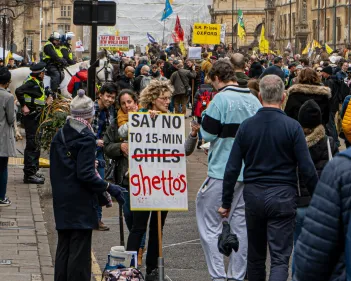15mC topic 3: Mobility policymaking in context of radical contestation

Protest against 15-minute cities in Oxford, England.
© Benjamin Elliott
Challenge description
Ambitious strategies and policies often fail when they lack political support or face strong opposition. The impact of digital platforms has boosted this dynamic by propelling the loudest voices, creating echo chambers, but also by amplifying misinformation. Since mobility policies directly affect urban space and daily life of city dwellers and visitors, they have become a central arena to increasingly polarised public debates. This topic seeks to better understand the underlying motives behind radical contestation of mobility policies, develop pragmatic strategies to address these and counter misinformation, while advancing participatory approaches to urban mobility policymaking that create space for constructive dialogue and compromise.
Scope
Urban mobility policies often entail complex challenges and conflicting interests, e.g. between personal freedom and the public good. While heated public debate represents a core democratic process, recent years have shown that misinformation can fuel radical opposition, distorting discussions and obstructing necessary change. In this tense climate, even the anticipation of backlash can lead to policy paralysis, reinforcing a cycle of political inaction and contestation. There is a growing demand to address misinformation and radical contestation and their impact on urban mobility policymaking.
Proposals under this topic are encouraged to build capacity among policymakers and develop practical tools to navigate increasingly polarised public discussions. This may include identifying essential but controversial policies for urban mobility transitions (e.g. low emission zones, reduction of parking), analysing and learning from both successful and failed policy implementation at local, regional and national level. Furthermore, applicants are invited to examine recent instances where misinformation has driven radical contestation of urban mobility policies, analysing the spread and consequences of such narratives as well as appropriate counters.
Understanding the underlying needs and drivers of contestation – including cultural and traditional identity, perceived customary rights or rejection of structural change – is crucial, as is co-creating conditions of acceptability and compromise. Proposals should explore how to differentiate legitimate concerns and expectable trade-off of interests from misinformation-fuelled opposition and develop targeted approaches to engage in debate. This includes providing policymakers with effective communication strategies to reframe public interest of mobility policies from a people-centred perspective, convey tangible policy (co-)benefits and craft targeted messaging and narratives, especially for sceptical groups.
Furthermore, proposals are encouraged to advance participatory approaches to urban mobility policymaking, creating space for constructive dialogue and compromise. This could involve testing and applying empathetic engagement tools that bring in underrepresented groups, while preventing public debate be dominated by the loudest voices. This topic aims to build on governance and institutional innovation and highlight the power of partnerships with key stakeholders (e.g. schools, businesses, community leaders, and influencers) to improve transparency, strengthen public trust and facilitate policy implementation.
Project proposals submitted under this topic should address one or several of the following issues:
- Which lessons can be drawn from case studies of misinformation-fuelled contestation in urban mobility policy?
- Which tools and strategies can help policymakers navigate polarised debates and effectively counter misinformation?
- How can policymakers distinguish between legitimate concerns and misinformation-driven resistance?
- How can methods and approaches to communicate mobility policies be informed by a deeper understanding of underlying needs and drivers of contestation?
- How can participatory processes empower diverse stakeholders, including underrepresented groups, and strengthen partnerships for more inclusive and constructive debate?
- Which good practices for co-designing local mobility measures that encourage open dialogue and compromise can be developed further?
Expected outputs and outcomes
Rather than focusing on isolated technical solutions, projects are expected to approach this topic through systems thinking, place-based and human-driven strategies related to this topic. Project outcomes should be both impact-oriented and process-driven, aiming to be as concrete and user-centred as possible. Projects should clearly define their expected outputs in relation to the chosen question. Expected outputs include, but are not limited to:
- Comprehensive analysis of spread, impact and counters to misinformation and radical contestation in urban mobility policymaking.
- Practical tools, guidelines and training programmes to equip policymakers with strategies to understand underlying needs and drivers of contestation and support in countering misinformation.
- Methodologies and effective communication strategies to build trust, increase acceptance and tailor messaging to different target audiences.
- Mobility scenarios and storytelling to illustrate real-life impact of mobility policies on urban quality of life.
- Innovative participatory tools to strengthen engagement and partnerships with key stakeholders.
- Good practices and frameworks for co-designing urban mobility policies that foster open dialogue and mitigate polarisation.